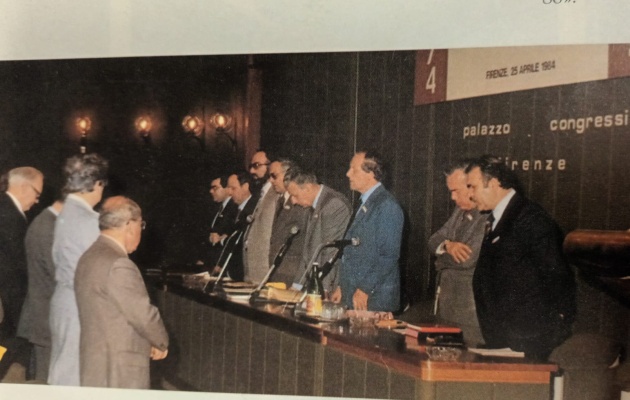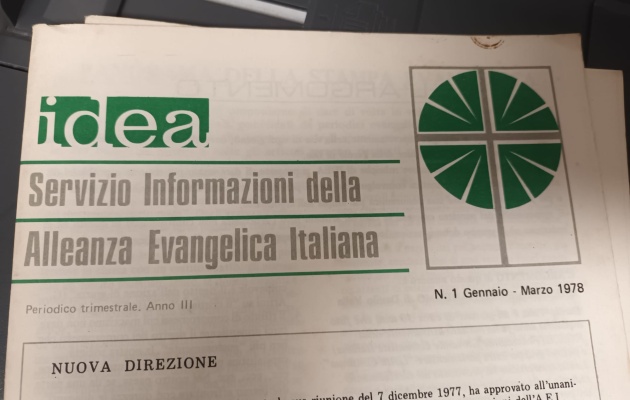The Italian Evangelical Alliance celebrates 50 years. A look back to the early years of vitality and growing unity.
![The 10th anniversari celebration of the Italian Evangelical Alliance (AEI) in a congress in Firenze, 1984. / Photo: [link]AEI[/link].](https://cms.evangelicalfocus.com/upload/imagenes/661e4de46bdce_aei1974aCropped.jpg) The 10th anniversari celebration of the Italian Evangelical Alliance (AEI) in a congress in Firenze, 1984. / Photo: [link]AEI[/link].
The 10th anniversari celebration of the Italian Evangelical Alliance (AEI) in a congress in Firenze, 1984. / Photo: [link]AEI[/link].
Fifty years is always an important anniversary for any life, private story, or historical event.
This is especially so when it comes to celebrating 50 years of an evangelical organization located in a difficult and minority context like Italy.
For this reason, the Italian Evangelical Alliance (AEI) is very grateful to celebrate its first half a century of history, decades that consist largely of forward motion, difficult moments, unstable situations and peaks of vitality, but always lived under the banner of unity and evangelical orthodoxy.
The Italian Evangelical Alliance was officially born in 1974, but its roots go back much further.
The birth of the first Evangelical Alliance in London in 1846 came out of the ferment of “evangelical awakenings” in different parts of the world, which had renewed and revived the legacy of the Protestant Reformation.
At the same time, however, in Italy, movements for national unity, also driven by a certain idea of secularism against a papacy that still owned much of Italian territory, had accentuated Catholic reactionism. In this context, evangelicals were slowly penetrating the nation, also with the help of foreign missions, while the Evangelical Alliance was quickly establishing itself as the representative body of an awakened evangelical Christianity.
In this context, there was one man who understood the need to promote evangelical unity in Italy in such a fluid and dynamic context. Paul Geymonat, born in 1837 in Villar Pellice to a Waldensian family, had been educated in the European Awakening environment and had studied at the theological faculty in Geneva.
After completing his studies, he became a Waldensian pastor and was sent to Florence. He was not immune to persecution, and after the fall of the Tuscan Republic in 1849 and the return of Grand Duke Leopold, he was imprisoned and exiled. After sojourns in Turin and Genoa, he returned to Florence, where he acted as a bridge between the various components of evangelicalism that had formed and began to advocate for the union of the churches and laid the groundwork for the establishment of the Evangelical Alliance in Italy.
It was Geymonat who, in a document written in 1864, hypothesized the purposes for the eventual birth of an Italian Alliance. Looking back on the fruitful 20 years of the Evangelical Alliance elsewhere, he hoped for an equal form of unity for Italy, also as a form of witness to freedom in the true biblical faith that could stand against the unbalanced and authoritarian reactions of Rome.
Unfortunately, due to internal mistrust and lack of cooperation, Geymonat never saw his goal realized. In 1891, however, he himself had the opportunity to inaugurate the ninth international conference of the Evangelical Alliance, held in Florence from April 4 to 12, with the participation of many Italians.
These appeals did not fall on deaf ears and were taken up again after the Second World War, when the international scenario had completely changed.
By the 1970s, years after recovery from the two world wars, the national and international evangelical world had changed completely.

[photo_footer] Prayers at the 1984 AEI congress in Firenze. / AEI[/photo_footer] The era of Pentecostalism and the fundamentalist movement in response to liberalism had begun, and at the same time a liberal-minded ecumenical movement had emerged that would lead to the formation of the Ecumenical Council of Churches (CEC) in Amsterdam in 1948, where the “historic” Protestant churches found a federative form with the Eastern Orthodox churches.
Thus, the World Evangelical Alliance was founded in 1951, which, following the history and ideals of the Evangelical Alliance of 1846, wanted to offer this evangelical experience of unity the possibility of finding a liaison body with a world profile different from that of the liberal CEC.
In the years that followed, various national evangelical alliances were formed and linked on a continental and worldwide basis. In this context of various unified revivals, there was also that of the new face of Roman Catholicism that came out of the Second Vatican Ecumenical Council (1962-1965).
In Italy, the echoes of these world dynamics, although muffled and weakened by the minority situation that Evangelicalism was experiencing, did not take long to manifest themselves and find forms of correspondence.
Meanwhile, the international evangelical world was urging the Italian evangelical world not to remain closed in on itself, but to participate in the evangelical “resurgence” that was taking place after the end of the Second World War.
It was at the European Congress on Evangelization that Billy Graham convened in Amsterdam in 1971 that a pivotal event occurred. The large Italian delegation, composed of pastors and evangelists from Pentecostal and Free Churches, appreciated the goodness of being together, not only in terms of fraternal fellowship, but also in terms of more solid cooperation. In the words of Elio Milazzo, the first president of the Italian Evangelical Alliance, “in Amsterdam the desire was expressed to give continuity to a relationship that would otherwise have lasted only a few days".
Thus, in November 1974, the unifying work of the participants of the Amsterdam Congress led to the foundation of the Italian Evangelical Alliance.
In the same year, the World Evangelization Congress was held in Lausanne, where some Italians who had participated breathed in the air of the revival of world evangelization and brought it back to their country to collaborate in the birth of the Italian Evangelical Alliance.
In the report on Italy presented at the Lausanne Congress by Franco A. Bono, the first point is precisely the establishment of the Italian Evangelical Alliance and the need for a unified commitment to an all-Evangelical nation.

[photo_footer] An edition of Idea, the AEI's magazine, in 1978. / AEI [/photo_footer] AEI was immediately born, composed of a wide range of denominations representing the entire Italian evangelical movement. The first decade of AEI's life was thus characterized by a certain vitality and diversity, and from the earliest years of its birth, AEI organized itself by means of a quarterly printed periodical titled Idea, which still exists, despite some changes and interruptions.
Although in minority conditions and with its own internal criticalities, AEI also managed to help curb the risks of compromise with Roman Catholicism by world evangelicalism. It was the Italian and Spanish denunciations that later led to the official position of the Theological Commission of the World Evangelical Alliance on Roman Catholicism (Singapore 1986).
After a vital and dynamic first decade, there were signs of exhaustion that led to an initial period of stagnation and testing of AEI's resilience.
This is the first article in a series of articles on the history of the Italian Evangelical Alliance.
Chiara Lamberti, staff member of the AEI in Rome.

Las opiniones vertidas por nuestros colaboradores se realizan a nivel personal, pudiendo coincidir o no con la postura de la dirección de Protestante Digital.
Si quieres comentar o